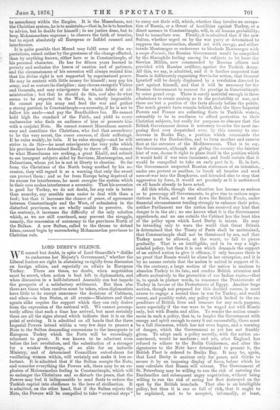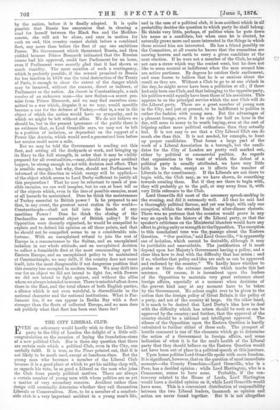LORD DERBY'S SILENCE.
1VE cannot but doubt, in spite of Lord Granville's "dislike to embarrass her Majesty's Government," whether the Liberal leaders are right in abstaining so rigidly from discussion on foreign affairs, and especially on affairs in European Turkey. There are times, no doubt, when negotiation must be secret, when action is best left to diplomatists, and when discussion in a half-informed Assembly can but impede the prospects of a satisfactory settlement. But then also there are times when resolves must be taken, when diplomatists have little to do except announce the decisions of Cabinets, and when—in free States, at all events—Ministers and their agents alike require the support which they can only derive from the expression of the national will. We cannot peremp- torily affirm that such a time has arrived, but most certainly there are all the signs abroad which indicate that it is on the point of arriving. It is admitted on all hands that the three Imperial Powers intend within a very few days to present a Note to the Sultan demanding concessions to the insurgents in European Turkey which the Porte will be exceedingly reluctant to grant. It was known to be reluctant even before the last revolution, and the substitution of a stronger for a weaker Sovereign, of an able for an imbecile Ministry and of determined Councillors out-of-doors for vacillating women within, will certainly not make it less re- luctant. It is admitted that if the Sultan accepts the Note, and concedes everything the Powers ask, there may be an ex- plosion of Mohammedan feeling in Constantinople, which will so endanger the Christians and so disturb the peace that the Powers may feel it indispensable to send fleets to reduce the Turkish capital into obedience to the laws of civilisation. It is admitted, on the other hand, that if the Sultan rejects the Note, the Powers will be compelled to take "eventual steps" to carry out their will, which, whether they involve an occupa- tion of Bosnia, or a threat of hostilities against Turkey, or a direct menace to Constantinople, will, in all human probability, lead to immediate war. Finally, it is admitted that if the new Sultan, whether urged on by the war party or determined to suppress the insurrection, should act with energy, and either invade Montenegro or endeavour to blockade Montenegro with a corps dermas, the Russian Government would be compelled by the Slavophile feeling among its subjects to let loose the Servian Militia, now commanded by Russian officers and provided with Russian artillery, against the Turkish Army. All this, we say, is admitted, and it is further suspected that Russia is deliberately organising Servia for action, that General Ignatieff will be deeply displeased by a revolution directed in part against himself, and that it will be necessary for the Russian Government to recover its prestige in Constantinople by some grand coup. There is surely material enough in these admissions to create anxiety as to the probability of war, and. these are but a portion of the facts already before the public. The much greater facts remain behind, that the three Imperial Powers and France are collecting fleets in Turkish waters, ostensibly to be in readiness to afford protection to their Christian subjects, but really for purposes so obscure that the British Government deems it necessary to order the most im- posing fleet ever despatched even by this country to ren- dezvous in Besika Bay, a position which commands the entrance to the Dardanelles, and to form another and reserve fleet at the entrance of the Mediterranean. That is to say, the Government, although not giving the country the faintest hint of war, deems it right to place itself in the position which it would hold if war were imminent, and itself certain that it would be compelled to take an early part in it. If, in fact, the Government suspected Russian statesmen of an intention, under one pretext or another, to break all treaties and send. men-of-war into the Bosphorus, and intended also to stop that aggression by force, it would act precisely as it is understood. on all hands already to have acted.
All this while, though the situation has become so serious as to preoccupy all Governments, to give rise to serious nego- tiations in Paris, and to send down the British Funds, under financial circumstances tending strongly to enhance their price, neither Parliament nor the nation has received any hint that danger is in the air ; no one knows what it is the Government apprehends, and no one outside the Cabinet has the least idea of the policy upon which Lord Derby is intent. He may be intending only to warn the world that Great Britain is determined that the Treaty of Paris shall be maintained, that Constantinople shall not be threatened by sea, and that Turkey must be allowed, at the worst, to fall to pieces gradually. That is an intelligible, and in its way a high- minded policy, but then it is one which demands the support of an united nation to give it efficacy, if only because there is no proof that Russia would be alone in her enterprise, and it is by no means certain that the nation is united in support of it. On the contrary, a large section of the nation is anxious to abandon Turkey to its fate, and confine British attention and. efforts exclusively to the protection of our Indian route,—that is, to speak in plainer words, to renounce the Protectorate of Turkey in favour of the Protectorate of Egypt. Another large section, though not prepared for this decided course, is most averse to engage a second time in war for Turkey, and would. resent, and possibly resist, any policy which looked to the ex- penditure of British lives and treasure for any such purpose, more especially if the war were to be waged not with Russia only, but with Russia and allies. To render the nation unani- mous in such a policy, that is, to inspire the Government with energy and spirit enough to carry it out successfully, there must be a full discussion, which has not even begun, and a warning of danger, which the Government as yet has not frankly given. To adopt such a policy secretly, with the nation un- convinced, would. be madness ; and yet, after England has refused to adhere to the Berlin Conference, and after the signataries to the Note have determined to present it, the British Fleet is ordered to Besika Bay. It may be, again, that Lord Derby is anxious only for peace, and thinks to secure it by an imposing display of force, before which he may calculate that Russia will retreat. The Government of St. Petersburg may be willing to run the risk of entering the Dardanelles and subsequent angry negotiation, without being willing to run the risk of seeing her fleet destroyed. on the spot by the British ironcluls. That also is an intelligible policy, but then it is one so full of risk, that it ought to be explained, and to be accepted, informally, at least, by the nation, before it is finally adopted. It is quite possible that Russia has assurances that in clearing a road for herself between the Black Sea and the Mediter- ranean, she will not be alone, and once in motion for such an end, this country cannot shrink before a combined fleet, any more than before the fleet of any one ambitious Power. No Government which threatened Russia, and then yielded because Prince Bismarck intimated that the Russian course had his approval, could face Parliament for an hour, even if Parliament were secretly glad that it had shown so much timidity. The mere mention of such a contingency, which is perfectly possible, if the reward promised to Russia for her inaction in 1870 was the total destruction of the Treaty of Paris, is enough to show the extent of the danger which may be incurred, without the consent, direct or indirect, of Parliament or the nation. An entente in Constantinople, a rash resolve of an unknown man—the new Sultan—a secret pro- mise from Prince Bismarck, and we may find ourselves com- mitted to a war which, disguise it as we may, would speedily become a war for the defence of Turkey,—that is, a wax in the object of which the nation would have no sympathy, and in which we might be left without allies. We do not believe we should be, but in the present ignorance of the public there is no evidence that, as Lord Granville says, we may not be left in a position of isolation, or dependent on the support of a Power like Austria, which would need a guaranteed loan before her armies could move a mile.
But we may be told the Government is sending out this fleet, and setting all the dockyards at work, and bringing up its Navy to the full strength, in order that it may be visibly prepared for all eventualities,—may, should any grave accident happen, be strong enough to act with decision and effect. That .is sensible enough ; but why, then, should not Parliament be informed of the direction in which energy will be applied,— of the object which seems to Lord Derby sufficient to justify all this preparation ? That he may be reluctant to speak of pos- sible enemies, we can well imagine, but he can at least tell us of the objects which, even in the face of possible enemies, must at all hazards be maintained. Does he think the maintenance of Turkey essential to British power ? Is he prepared to see that, in any event, the greatest naval station in the world- Constantinople—shall not fall into the hands of any maritime Power ? Does he think the closing of the Dardanelles an essential object of British policy? If the Opposition were decently organised, he would be compelled to explain and to defend his opinion on all those points, and that he should not be compelled seems to us a considerable mis- fortune. With an unexplained refusal to join the rest of Europe in a remonstrance to the Sultan, and an unexplained isolation in our whole attitude, and an unexplained decision to collect a formidable fleet at the most commanding spot in Eastern Europe, and an unexplained policy to be maintained at Constantinople, we may drift, if the country does not rouse itself, into the most disagreeable if not dangerous position that this country has occupied in modern times. We may drift into war for an object we did not intend to fight for, with Powers we did not intend to fight against, and without the allies whom we always intended to secure. There is mischief afloat down there in the East, and the total silence of both English parties, a silence which is not even watchful, is discreditable to the national character and the national institutions. What is Par- liament for, if we can appear in Besika Bay with a fleet stronger than the fleets of collected Europe, and no man dare ask publicly what that fleet has been sent there for?































 Previous page
Previous page